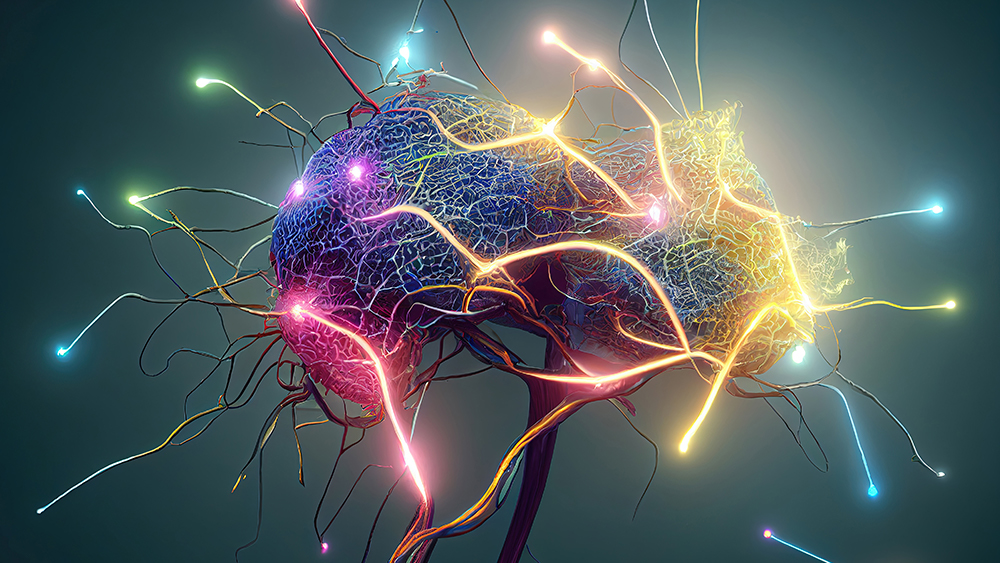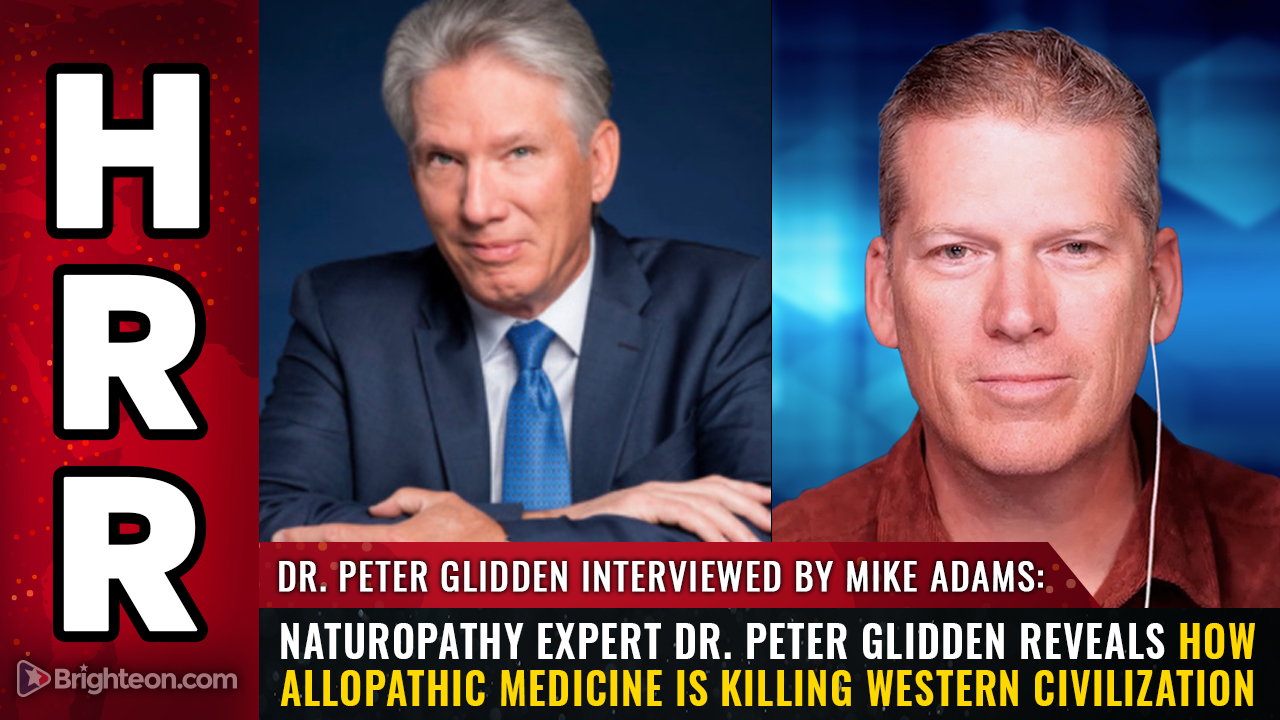How diet and neurotransmitters shape your brain power: Keys to mental clarity and longevity
07/05/2025 / By Willow Tohi

- Neurotransmitters like dopamine and serotonin regulate appetite, mood and metabolism—a balanced diet stabilizes them.
- Protein-rich meals (e.g., broiled fish) boost alertness, while excess fats and carbs induce sluggishness.
- High-fat, high-cholesterol diets reduce oxygen flow to the brain, impairing cognition and increasing stroke risk.
- Complex carbs (whole grains, veggies) at night promote relaxation, while daytime protein optimizes focus.
- Exercise and low-fat diets improve mental acuity—studies show cognitive test scores rise within weeks of dietary changes.
For millennia, humans have suspected that diet influences the mind—from Galen’s ancient “humor” theory to today’s neuroscience. Modern research confirms that neurotransmitters—dopamine, serotonin and norepinephrine—dictate mental sharpness, mood and metabolic health. Recent studies highlight the gut-brain axis, where gut microbiota produce up to 90% of the body’s serotonin, directly impacting mood regulation. Probiotics, found in fermented foods like yogurt and kimchi, foster this microbial environment, which may reduce anxiety and improve focus. Additionally, chronic inflammation from diets high in processed foods can disrupt the blood-brain barrier, further dampening cognitive function. With rising rates of diabetes and cognitive decline linked to poor nutrition, understanding this connection is more urgent than ever.
Protein vs. carbs: The alertness equation
A broiled fish fillet (about 3 ounces) triggers dopamine and norepinephrine, enhancing alertness and assertiveness. Conversely, refined carbs (bread, pasta) spike serotonin, promoting relaxation—ideal for evenings but counterproductive during work hours. Specifically, the amino acid tryptophan (found in oats and turkey) serves as serotonin’s precursor, while tyrosine (in almonds and avocados) fuels dopamine. A 2015 study in NeuroImage revealed that high-protein diets correlate with increased prefrontal cortex activity, critical for decision-making. Low dopamine levels can drive sugar cravings, as the brain seeks a temporary fix; dietitian Mpho Tshukudu adds, “Skipping meals can crash dopamine, leading to impulsive snacking.” Opt for lean proteins like grilled chicken or tofu midday to maintain sustained cognitive performance.
Oxygen crisis: How fat clogs your brain’s fuel line
The brain consumes 25% of the body’s oxygen despite being just 2% of its weight. Red blood cells deliver oxygen, but fatty diets cause triglycerides to adhere to their membranes, forming rouleaux formations—like a stack of coins—that restrict blood flow. This clumping blocks microcapillaries, starving brain cells. Chronic high cholesterol fuels atherosclerosis, reducing cerebral blood flow by up to 40% in severe cases. Nathan Pritikin’s landmark study showed that participants on a low-fat, whole-foods diet improved math-solving speed by 32% within weeks. Follow-up data indicated these cognitive gains persisted long-term, with participants reporting sharper memory and focus after six months.
Strategic eating for peak performance
- Morning/Daytime: Start with coffee or tea—especially green tea, rich in L-theanine, which elevates alpha brain waves for calm focus. A balanced breakfast might include a spinach omelet with smoked salmon (omega-3-rich protein), along with roasted tomatoes. Midday, opt for a salad topped with wild-caught salmon and avocado. Avoid fatty dressings; instead, use lemon and balsamic.
- Evening: Enjoy complex carbs like quinoa with roasted vegetables or a small portion of whole-grain pasta paired with leafy greens. Fermented foods (e.g., miso soup) boost gut-derived serotonin.
- Lifestyle habits: Incorporate 20-minute walks 3-4 times weekly. Exercise stimulates BDNF (brain-derived neurotrophic factor), promoting neuroplasticity and neuron growth. Prioritize sleep (7-9 hours) to restore neurotransmitter balance: during deep sleep, brain waves reset the prefrontal cortex, optimizing alertness the next day.
The hidden power of micronutrients
Beyond macronutrients, vitamins and minerals play unsung roles. Magnesium, in spinach and pumpkin seeds, regulates calcium channels in neurons, enhancing signal transmission. Vitamin K, abundant in broccoli, combats amyloid plaque buildup. Antioxidants (e.g., blueberries, dark chocolate) neutralize free radicals that hinder oxygen utilization. Adding these foods to meals supercharges cognitive resilience, countering oxidative stress linked to aging.
Diabetes and cognitive decline: A two-way road
Chronic high blood sugar damages memory pathways, accelerating Alzheimer’s risk. A 2020 JAMA Neurology study found that Type 2 diabetics have a 65% higher likelihood of developing dementia. “Type 3 diabetes” hypotheses suggest insulin resistance in the brain disrupts glucose metabolism, fueling beta-amyloid accumulation. Intranasal insulin trials (Dr. Vera Novak’s work at HMS) show promise in restoring memory in early Alzheimer’s, highlighting the brain’s metabolic dependency on diet.
Feed your brain like a high-performance engine
Just as a tuned car runs efficiently, the brain thrives on steady fuel: oxygen-rich blood, nutrient-dense foods and balanced neurotransmitters. The science is clear—protein by day, carbs by night—paired with hydration (sipping water throughout the day prevents focus-impairing dehydration). Prioritize omega-3 fatty acids (e.g., walnuts, flaxseeds) to nourish cell membranes while exercising regularly to boost BDNF. By aligning diet with brain chemistry, you optimize focus and stave off decline, turning “you are what you eat” into actionable strategy for lifelong cognitive vitality.
Sources for this article include:
Submit a correction >>
Tagged Under:
brain function, brain powder, diet, digestion, fight depression, fight obesity, fitness, grocery cures, gut health, lifestyle, longevity, mental health, mind body science, natural cures, nutrients
This article may contain statements that reflect the opinion of the author





















